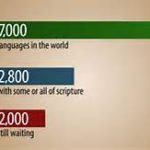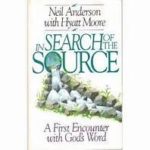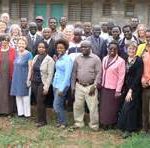“That the world may know.”
God’s charge to Israel (Ex 7:5, 17; 8:10, 22; 14:4, 18), is coupled with the news about Jesus which was “spread abroad” (Matt 9:26; Mark 1:28, 45; 7:36).
 The famous scholar-pastor-linguist John Wycliffe translated the Bible into English in 14th century England. Having the Bible in their own language, British people could hear and read in words they understood.
The famous scholar-pastor-linguist John Wycliffe translated the Bible into English in 14th century England. Having the Bible in their own language, British people could hear and read in words they understood.
A wave of preaching ensued through the Lollards—Wycliffe’s itinerant parsons—which began to transform peoples’ mindset and ultimately, English society at large. The results of Wycliffe’s work inspired the inception of an international translation endeavor which would spread the good news of the gospel throughout the world: Wycliffe Bible Translators.
 The organization began with a young college student selling Bibles. A century later, Bibles are being given away. William Cameron Townsend realized while in Guatemala to be a Bible salesman that the people could not read Spanish. Townsend committed himself to learn the native Ketchakel language. The work started in Guatemala spread to Mexico, Peru and throughout the Americas.
The organization began with a young college student selling Bibles. A century later, Bibles are being given away. William Cameron Townsend realized while in Guatemala to be a Bible salesman that the people could not read Spanish. Townsend committed himself to learn the native Ketchakel language. The work started in Guatemala spread to Mexico, Peru and throughout the Americas.
 Wycliffe Bible Translators was born in 1917 and has completed translation work in over 1300 spoken languages around the world. Translation projects continue in hundreds of other languages while hundreds more are waiting to begin. An estimated 7000 languages are spoken throughout the world.
Wycliffe Bible Translators was born in 1917 and has completed translation work in over 1300 spoken languages around the world. Translation projects continue in hundreds of other languages while hundreds more are waiting to begin. An estimated 7000 languages are spoken throughout the world.
 World-wide language impact necessitates a trans-global knowledge of linguistics. Wycliffe’s strategic partner the Summer Institute of Linguistics (SIL) brings together scholars with language groups to understand and decode verbal constructions for communication. Results from intensive study include literacy improvements and engagement with Scripture. SIL has sites around the world which teach those interested in contacting those who have never heard of Jesus and His transformative work. Wycliffe then utilizes the study of SIL for translation work.
World-wide language impact necessitates a trans-global knowledge of linguistics. Wycliffe’s strategic partner the Summer Institute of Linguistics (SIL) brings together scholars with language groups to understand and decode verbal constructions for communication. Results from intensive study include literacy improvements and engagement with Scripture. SIL has sites around the world which teach those interested in contacting those who have never heard of Jesus and His transformative work. Wycliffe then utilizes the study of SIL for translation work.
 Wycliffe Bible Translators connects Genesis 11 with Acts 2 in anticipation of Revelation 5. Disobeying God’s original command (Gen 2:15-16) Adam and Eve were forced from the garden and the tree of life (Gen 3:22-24), but given an opportunity for renewed relationship with God.
Wycliffe Bible Translators connects Genesis 11 with Acts 2 in anticipation of Revelation 5. Disobeying God’s original command (Gen 2:15-16) Adam and Eve were forced from the garden and the tree of life (Gen 3:22-24), but given an opportunity for renewed relationship with God.
 God’s message to every tongue was to come through Abram (Gen 12:1-3): the immediate response to Babel (11:1-6), not to mention the flood (Gen 6-9), and Eden (Gen 3). Human unification under God’s headship was made available again by means of language. Acts 2:1-41 explains the event of “spiritual” Pentecost, one message going to all languages. The “firstfruits” of The Church were brought together with the unifying power of one message for a diversity of international “tongues.”
God’s message to every tongue was to come through Abram (Gen 12:1-3): the immediate response to Babel (11:1-6), not to mention the flood (Gen 6-9), and Eden (Gen 3). Human unification under God’s headship was made available again by means of language. Acts 2:1-41 explains the event of “spiritual” Pentecost, one message going to all languages. The “firstfruits” of The Church were brought together with the unifying power of one message for a diversity of international “tongues.”
 God worked within His own judgment of fractured communication to establish His Church. Though speech is different, believers are one in “The Word” (John 1:1; Gal 3:26-29; Eph 3:14-21). Understanding of others begins with hearing, the others-centered gospel, a hallmark of Wycliffe Bible Translators.
God worked within His own judgment of fractured communication to establish His Church. Though speech is different, believers are one in “The Word” (John 1:1; Gal 3:26-29; Eph 3:14-21). Understanding of others begins with hearing, the others-centered gospel, a hallmark of Wycliffe Bible Translators.
 Foundations in human communication practiced by Wycliffe Bible Translators begins with hearing; listening to others’ speech. The Hebrew word “hearing” in Scripture comprises a threefold concept: hearing (the sound reaches our ears and we receive it), listening (we transcribe the words we are hearing into understanding), obeying (hearing becomes understanding which is enacted through doing).
Foundations in human communication practiced by Wycliffe Bible Translators begins with hearing; listening to others’ speech. The Hebrew word “hearing” in Scripture comprises a threefold concept: hearing (the sound reaches our ears and we receive it), listening (we transcribe the words we are hearing into understanding), obeying (hearing becomes understanding which is enacted through doing).
“And all who heard it wondered at what the shepherds told them . . . And all who heard Him were amazed at His understanding and His answers” (Luke 2:18, 47).
“He who has ears to hear, let him hear” (Isa 45:22; Matt 11:13; 13:9; Mark 4:9; etc.).
“How are they to hear without someone preaching? . . . at the proper time manifested in his word through the preaching with which I have been entrusted by the command of God our Savior” (Rom 10:14; Titus 1:3).
Biblical principles form the foundation for translation at Wycliffe.
 Hearing others is the basis for a Wycliffe history like In Search of The Source; an appreciation of the way different people live and talk. Such Wycliffe stories are captivating for a wide age range. The efforts of an organization like Wycliffe Bible Translators is also an invaluable resource for integration of foreign language learning as well as a reconnection of the church to Genesis 11, Acts 2, and Revelation 5.
Hearing others is the basis for a Wycliffe history like In Search of The Source; an appreciation of the way different people live and talk. Such Wycliffe stories are captivating for a wide age range. The efforts of an organization like Wycliffe Bible Translators is also an invaluable resource for integration of foreign language learning as well as a reconnection of the church to Genesis 11, Acts 2, and Revelation 5.
 Outreach to indigenous peoples is helped by outreach to funding throughout Christian churches. Believers realize that evangelism begins as “faith comes from hearing and hearing by the word of Christ” (Romans 10:17). People need the Bible in their own language, first to hear, then to be discipled through God’s word. Multiple resources are available.
Outreach to indigenous peoples is helped by outreach to funding throughout Christian churches. Believers realize that evangelism begins as “faith comes from hearing and hearing by the word of Christ” (Romans 10:17). People need the Bible in their own language, first to hear, then to be discipled through God’s word. Multiple resources are available.
 Like so many other non-profit organizations, Wycliffe Bible Translators depend on financial resources. Interested parties are constantly being linked with banquets and programs which will herald the news of Wycliffe’s work. Churches, Sunday schools, youth groups, Christian schools, and family units utilize Wycliffe’s multi-faceted materials available around the world from print to digital formats.
Like so many other non-profit organizations, Wycliffe Bible Translators depend on financial resources. Interested parties are constantly being linked with banquets and programs which will herald the news of Wycliffe’s work. Churches, Sunday schools, youth groups, Christian schools, and family units utilize Wycliffe’s multi-faceted materials available around the world from print to digital formats.
Social media pushes the message to acquaint others, that the world may know.
Mark has been using Wycliffe materials in his classes since 1983. May The Word continue to have universal witness through Wycliffe’s local work. “Wycliffe” © is one of 22 articles included in the forthcoming History of Christianity in the United States (Rowman & Littlefield) by Dr. Mark Eckel.
References and Resources
Anderson, Neil and Hyatt Moore. In Search of the Source: A First Encounter with God’s Word. Portland, OR: Multnomah Press, 1992.
Hefley, James Hefley and Marti Hefley. Uncle Cam: The Story of William Cameron Townsend, Founder of the Wycliffe Bible Translators and the Summer Institute of Linguistics. Orlando, FL: Wycliffe Bible Translators, 1984.
Lazslo, Marilyn. Mission Possible: The Wonderful Story of God and a Wycliffe Translator in the Jungles of Papua New Guinea. Carol Stream, IL: Tyndale House Publishers, 1998.
“Summer Institute of Linguistics.” www.sil.org Accessed 10 January 2015.
Svelmoe, William Lawrence. A New Vision for Missions: William Cameron Townsend, The Wycliffe Bible Translators, and the Culture of Early Evangelical Faith Missions, 1917-1945. Tuscaloosa, AL: University of Alabama Press, 2008.
Wallis, Ethel Emily and Mary Angela Bennett. Two Thousand Tongues To Go: The Story Of The Wycliffe Bible Translators. Whitefish, MT: Kessinger Publishing, 2007.
“Wycliffe Bible Translators.” https://www.wycliffe.org/ Accessed 10 January 2015.

